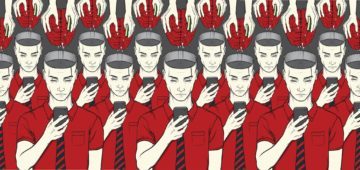Greg Miller in Nieman Lab:
 The United States of America was founded on a conspiracy theory. In the lead-up to the War of Independence, revolutionaries argued that a tax on tea or stamps is not just a tax, but the opening gambit in a sinister plot of oppression. The signers of the Declaration of Independence were convinced — based on “a long train of abuses and usurpations” — that the king of Great Britain was conspiring to establish “an absolute Tyranny” over the colonies.
The United States of America was founded on a conspiracy theory. In the lead-up to the War of Independence, revolutionaries argued that a tax on tea or stamps is not just a tax, but the opening gambit in a sinister plot of oppression. The signers of the Declaration of Independence were convinced — based on “a long train of abuses and usurpations” — that the king of Great Britain was conspiring to establish “an absolute Tyranny” over the colonies.
“The document itself is a written conspiracy theory,” says Nancy Rosenblum, a political theorist emerita at Harvard University. It suggests that there’s more going on than meets the eye, that someone with bad intentions is working behind the scenes. If conspiracy theories are as old as politics, they’re also — in the era of Donald Trump and QAnon — as current as the latest headlines. Earlier this month, the American democracy born of an eighteenth century conspiracy theory faced its most severe threat yet — from another conspiracy theory, that (all evidence to the contrary) the 2020 presidential election was rigged. Are conspiracy theories truly more prevalent and influential today, or does it just seem that way?
The research isn’t clear. Rosenblum and others see evidence that belief in conspiracy theories is increasing and taking dangerous new forms. Others disagree. But scholars generally do agree that conspiracy theories have always existed and always will. They tap into basic aspects of human cognition and psychology, which may help explain why they take hold so easily — and why they’re seemingly impossible to kill. Once someone has fully bought into a conspiracy theory, “there’s very little research that actually shows you can come back from that,” says Sander van der Linden, a social psychologist at the University of Cambridge whose research focuses on ways to combat misinformation. “When it comes to conspiracy theories, prevention is better than cure.”
More here.
